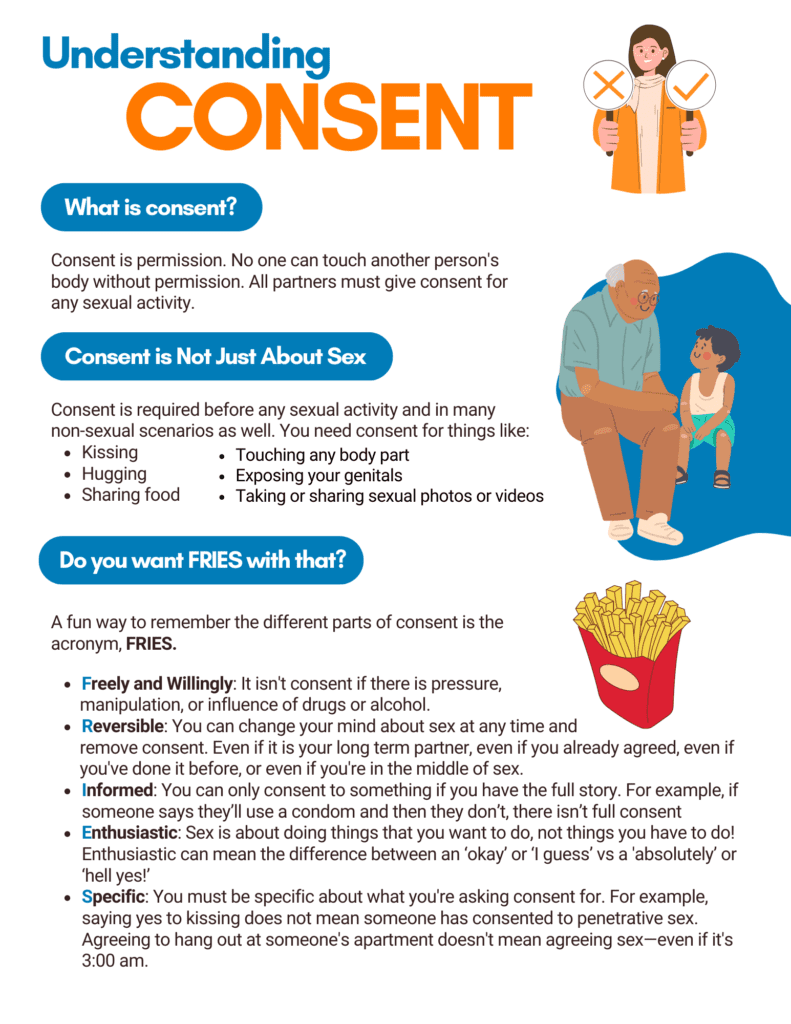Hello dear friend,
I hope you are enjoying the parenting content we are serving this month. A lot of thought and effort went into it, and we appreciate all the feedback you give us. Some of you have shared the blog with your loved ones, which is premium love, sharing wisdom and value. Thank you.
Check out some of our recent topics.
This week, I wanted to discuss a topic close to my heart, sex/sexuality and sexual relationships in young people. Maybe one day I will do some kind of training and offer some services in this area.
It is vital for young people to have the correct information. It empowers them to make informed decisions, protect themselves and mindfully engage in sex.
Sex education is an essential aspect of raising children. Still, many parents feel unsure about how or when to start the conversation. My friend told me how her dad made a bumbling mess of the whole discussion; it was embarrassing for both of them. Hahahahaha.
Have you had the talk yet? How did you do it? Care to share in the comments?


Addressing the topic of sex with honesty, sensitivity, and age-appropriate Information can help your child develop a healthy understanding of their body, relationships, and consent.
As a parent or caregiver, you play a critical role in shaping how your child perceives these issues, and an open, ongoing dialogue can create a safe space for questions and learning.
In this post, we’ll discuss how to approach sex education at home with a focus on honesty, sensitivity, and respect for your child’s individual development.
Why Sex Education Matters
Talking to children about sex from a young age helps them develop a positive sense of body image, healthy relationships, and informed decisions about their bodies. Research shows that children who receive comprehensive sex education are more likely to make responsible choices, have healthier relationships, and understand the importance of consent.
Introducing age-appropriate sex education at home can also foster trust between you and your child, ensuring they feel comfortable coming to you with questions and observations as they grow older and more mature.
When to have “the talk”.
Sex education doesn’t have to be a one-time, all-encompassing conversation. Instead, it’s best approached as a series of ongoing discussions that evolve as your child grows and their curiosity changes. Here’s how to approach sex education based on your child’s age:
– Young Children (Ages 3-7): Children are naturally curious about their bodies at this stage. Start by teaching them the correct names for body parts, and introduce the concepts of privacy and boundaries. For example, explain that certain parts of the body are private and that they have the right to say “no” if they don’t want to be touched.
– School-Aged Children (Ages 7-12): As children grow, they’ll become more aware of relationships and body changes. This is an excellent time to discuss puberty, reproduction, and the emotional aspects of relationships. Answer questions with age-appropriate, factual Information.
I take the approach of giving scientific names and processes, explaining in detail, and drawing diagrams. YouTube is a good resource for simple factual explanations for bodily changes. Some movies are also a good tool to stimulate discussion.
– Teens (Ages 13 and up): During adolescence, conversations should expand to include topics like consent, healthy relationships, contraception, and emotional well-being.
Encourage open dialogue about peer pressure, media influence, and the importance of making informed decisions. Using hypothetical situations in discussing these tough topics can be a useful tool.




Tips for Approaching the Conversation with Sensitivity
1. Create an Open, Non-Judgmental Space
– It’s important to establish an environment where your child feels safe asking questions and expressing concerns. Reassure them that no topic is off-limits and that they won’t be judged for curiosity. Prepare yourself adequately with facts and refrain from telling scary stories of doom and gloom.
Listen without interrupting and respond calmly; even if you feel uncomfortable, hold it; you are an adult. *Side eye*
2. Use Age-Appropriate Language
– Tailor your language to your child’s developmental level. For younger children, keep explanations simple and factual. For older children and teens, be more detailed and open to discussing the emotional aspects of relationships, consent, and sexuality.
A female teenager is probably going to need a practical lesson rather than a lecture on how to wear a sanitary towel, how to take it off, how to monitor cycles and maintain hygiene during periods. A male teenager is likely going to need the practice of disposing of soiled underwear and what to do when they get sexually excited in non-private spaces.
You get it; there is no blanket method; approach with compassion and kindness.
Subscribe to My Newsletter
3. Be Honest, but Don’t Overwhelm them with Information
– Honesty is essential, but it’s also important not to overwhelm your child with too much Information at once. Let their questions guide the conversation. If they ask something you’re not prepared to answer, it’s okay to take a moment and revisit the topic later with the right Information. This is not where you tell them everything you did wrong in your sex life. Self-disclosure is to be done with wisdom and caution.
4. Introduce the Concept of Consent Early
– Teaching consent from an early age is crucial. Explain that everyone has the right to decide what happens to their own body and that it’s important to respect others’ boundaries as well. As they grow older, this understanding of consent can expand to cover relationships and sexual interactions. Kids can learn to consent very early in interactions in the playground and within the home among siblings.
5. Address Media and Peer Influences
– Today’s children are exposed to sexual content through social media, TV, and their peers. It’s important to talk to your child about what they see and hear and help them distinguish between what’s realistic and what’s distorted by media.
Discuss the importance of healthy, respectful relationships and address any misconceptions they may have. Give a good amount of thought to access to the internet, the friends they have, and what values they express when it comes to this. Your child may not have access to porn, but their friends may.
6. Keep the Conversation Ongoing
– Sex education isn’t a one-time talk—it’s an ongoing dialogue. As your child grows, revisit the topic regularly, updating the Information to match their level of understanding. Encourage your child to come to you with any questions or concerns, and remind them that it’s okay to talk about their feelings and experiences.
A word of caution about building trust, if you react in dramatic ways when they tell you things, it is unlikely you will get Information freely next time. Building rrust. Doesn’t mean that you should not have boundaries or become permissive of everything, you are still a parent. It is a serious responsibility.


How to Navigate Sexual Conversation with Your Teenage Child
Certain aspects of sex education, such as sexuality, sexual orientation, and gender identity, can be particularly sensitive. Here’s how to navigate these conversations with care:
1. Acknowledge That Every Child Is Unique
– Respect your child’s unique developmental pace and identity. Be supportive if they express curiosity about different sexual orientations or gender identities. Let them know it’s normal to have questions and reinforce that everyone deserves respect and understanding.
2. Promote Body Positivity and Self-Acceptance
– Encourage your child to have a positive relationship with their body. Avoid using shameful or negative language when discussing sex or their bodies. Instead, emphasize that their body is their own and deserves care, respect, and attention. If you are a family of faith, discuss your faith perspective on this topic as well.
3. Discuss Emotional Health Alongside Physical Health
– Sex education shouldn’t just be about biology; it’s equally important to discuss the emotional aspects of relationships and sexual experiences. Help your child understand the importance of trust, mutual respect, and emotional safety in any relationship.
4. Answer Their Questions Even If They Surprise You
– Kids can sometimes ask questions that catch us off guard. When this happens, take a moment to gather your thoughts and answer honestly. If you don’t know the answer, it’s okay to say, “That’s a great question. Let me find out more about it, and we can talk again.”
Common Sexual Myths to Address
In addition to offering factual Information, it’s important to address common myths or misconceptions your child might encounter:
– “Everyone else is doing it.” Explain that peer pressure is common but shouldn’t dictate their choices. Every person’s readiness and comfort level are different.
– “Sex is only physical.” Discuss the emotional and spiritual aspects of relationships, explaining that sex is a deeply personal experience tied to trust and mutual respect.
– “Talking about sex encourages risky behaviour.” Studies show that children who receive comprehensive sex education are more likely to make informed and responsible choices.
You can Support My Work
Sex education at home can be an exciting experience for everyone involved. It will induce anxiety and also maybe fear, but in the long run, it is a worthy investment of time and effort.
We must not underestimate its role in raising informed, responsible, and emotionally healthy children.
Remember, the goal of sex education is not just to share facts but to foster a sense of safety, create a healthy, nurturing environment for growth, and encourage lifelong learning. With ongoing dialogue, you can equip your child with the knowledge and confidence they need to navigate their relationships and bodies with care and respect.
Until next time, stay authentic,
Stay resilient, and continue to honour your needs.
Live wholeheartedly,
Amaka

